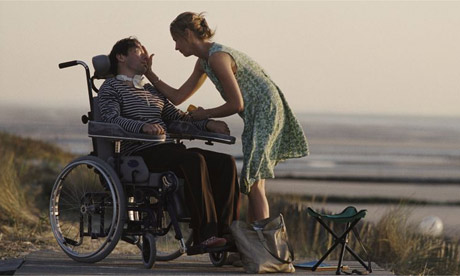The Diving Bell and the Butterfly (Julian Schnabel, 2007): USA / France
Reviewed by Brianna Romeo. Viewed on DVD.
 Movies often emphasize the importance of overcoming impossible limitations, many showing unfeasible actions that humans are unable to perform. Based on the memoir of Jean-Dominique Bauby (played by Mathieu Almaric), the editor-in-chief of French ELLE magazine undergoes a sudden stroke at the age of forty-three and awakens twenty days later to find himself paralyzed. His body, shut down in what is known as “lock-in syndrome;” caused him to lose almost all motor skills and left him to suffer in strict confinement within his own body.
Movies often emphasize the importance of overcoming impossible limitations, many showing unfeasible actions that humans are unable to perform. Based on the memoir of Jean-Dominique Bauby (played by Mathieu Almaric), the editor-in-chief of French ELLE magazine undergoes a sudden stroke at the age of forty-three and awakens twenty days later to find himself paralyzed. His body, shut down in what is known as “lock-in syndrome;” caused him to lose almost all motor skills and left him to suffer in strict confinement within his own body.
In The Diving Bell and the Butterfly , Jean-Dominique Bauby must live within these restrictions and attempt to communicate in the only form of movement that he is permitted: blinking with his left eye. The storyline, both empowering and brilliant, is shown through expressionism rather than action, with each scene filtered through a locked-in man’s experiences. The viewer experiences how entrapped Bauby is by his ailment by seeing through his left eye, and feels his emotions by experiencing his imagination. Schnabel grasps the concept of Jean-Dominique’s condition and uses Bauby’s biography, learning the French language himself and even attaching his own glasses to the camera lens for verisimilitude. The realness of Almaric’s performance and Schnabel’s guidance is mesmerizing; each moment will awaken every emotion and produce the fear, loss, happiness, and hope that Bauby elucidates in his memoir.
The movie is much different from the classical Hollywood approach; its ethereal honesty is brutal as Bauby struggles to communicate without speaking and moving. At times, it was hard for me to watch the movie without wanting to leave the character’s point-of-view and watch it outside of his “locked-in” syndrome. The disturbing opening scene just begins the frustrating, but remarkable, editing as a doctor sews his right eyelids shut to prevent infection. “Jean-Do,” as his friends call him, narrates the film around the experience he has as a prisoner. Like any other human, he laughs, cries, lusts, and is too proud to admit how embarrassed he is of other people bathing him like an infant. Though his communication is severed through speech, he uses the guidance of therapists to learn a new form of communication. By using his left eye’s capability, the therapists recite letters in order of most frequent use from the alphabet, and Bauby blinks once for “yes” and twice for “no.” In this way, the therapists understand how he lives inside of his body and come together to write a memoir, as Jean-Do recites one letter at a time to form words, sentences, and eventually a novel. In his own words, Jean-Do describes the rewards he gains from his experience; “My diving bell becomes less oppressive, and my mind takes flight like a butterfly…there is so much to do.”
The eloquence of The Diving Bell and the Butterfly displays the magnificence of Jean-Dominique Bauby’s situation and his hope that he will overcome his tragedy. As Bauby progresses through each day, his imagination becomes the world in which he lives, and it is in this place is where he survives and ultimately conquers the limitations of his body. The wonderful cinematography and musical score take you inside the prison in which Bauby must hide, and shows you what is underneath the surface of a paralyzed body, both from his perspective and that of other characters. I especially enjoyed the settings outside the hospital in which Bauby had to face the outside world, showing the bright, airy, and mysterious world he would never again be able to maneuver. For Jean-Dominique, even though all he had was one eye from which to witness the world, this was not enough to stop him from living.
His memoir of the same name, Le scaphandre et le Papillon was highly received upon its release in 1997, and tells of his life before and after his stroke. That same year, Jean-Dominique Bauby died of pneumonia. This movie, a tribute and a blessing, honors Bauby, and is a reminder of the beauty and spirit one human can possess. Its unobtrusive manner, wholehearted sincerity, and unique interpretation of Jean-Dominique’s story will radiate your heart and leave you to reflect on what is truly the most important part of a person–the soul.
4 Comments
Jump to comment form | comments rss [?] | trackback uri [?]